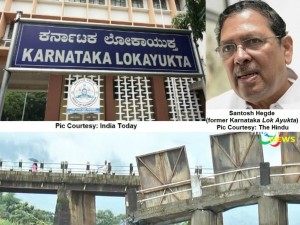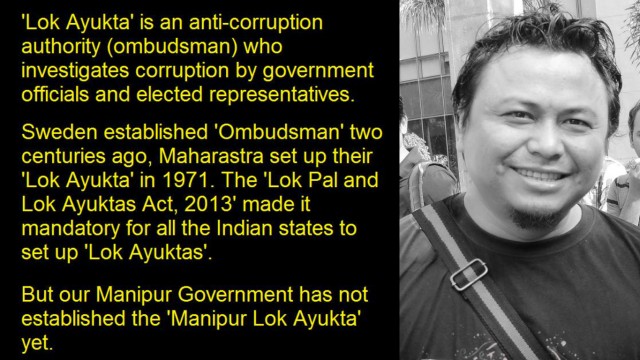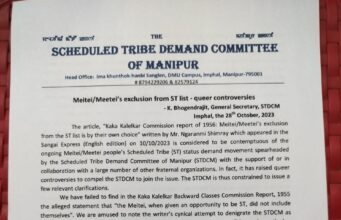By Ringo Pebam
“Corruption is a violation of human rights that leads to ‘systematic economic crimes’, and a ‘serious malady undermining the very health of the polity’ ”.
– Supreme Court
Manipur’s modern culture of corruption is the nexus of contractor-technocrat-bureaucrat-politician who steals public money in standardised percentages. This organised system of robbery loots our money. The public money meant for building infrastructures have turned into marble palaces, sports utility vehicles (SUVs) and expensive apartments owned by government employees and politicians in the metropolises of the country.
The current scenario gives us no guarantee that we won’t lose many other opportunities to corrupt practices in regards to development of our state; whether be it in giving jobs to the deserving, or in implementation of laws and development programs/ schemes that directly or indirectly affects us (unknowingly).
The ‘Let it be’ disease has infected the eyes and minds of us all so much that we have developed a sense of immunity from any of the prevalent economics, cultural and political state of Manipur.
How many times do we remember discussing corruption with our friends over a drink? We come up with all the Utopian solutions and criticise the policy and opinion makers of the state and we forget the topic as we part.
Carrying along this guilt (inaction) with me, I roamed about the city few days ago enquiring the existence of a Lok Ayukta office, which many states of India have. I visited courts, met legal luminaries, and inquired for Lok Ayukta’s office, but I was told that Manipur government has not appointed a Manipur Lok Ayukta yet.
What/ who is Lok Ayukta?
The Lok Ayukta is an anti-corruption authority ombudsman (an ombudsman is an official, appointed by the government or by parliament to represent the interests of the public). It deals with abuse of administrative discretion, misuse of power, mal-administration, inefficiency, administrative corruption, nepotism, discourtesy etc. Any citizen can make his/her complaints of corruption directly to the Lok ayukta against any government official or elected representative. The Lok Ayukta investigates allegations of corruption and mal-administration against public servants and is tasked with speedy redressal of public grievances. The Lok Ayukta is usually a former High Court Chief Justice or former Supreme Court judge and has a fixed tenure.
Brief history of ‘Ombudsman’
The earliest democratic institution created in the world for citizens’ grievances was in Sweden 1809. The Swedish ‘Ombudsman’ deals with abuse of administrative discretion, misuse of power, mal-administrative, inefficiency, administrative corruption, nepotism, discourtesy etc. Following the Swedish Ombudsman all other Scandanavian countries also established Ombudsman. In other countries like France, they established French system of ‘Administrative Court’. In erstwhile USSR and other communist countries they established in the name of ‘Procurated System’.
Brief history of ‘Lok Pal’ and ‘Lok Ayukta’
In India, the ‘Ombudsman’ is called ‘Lok Pal‘ (at Central Level) and ‘Lok Ayukta‘ (at State level).
The concept of a constitutional ombudsman was first proposed in parliament by Law Minister Ashoke Kumar Sen in the early 1960s. The term “Lok Pal” was coined by Dr. L.M. Singhvi in 1963.
The Administrative Reforms Commission of India 1966-70 (headed by Morarji Desai) after studying the ombudsman model in Scandanavian countries (who have had an ombudsman for over 200 years), recommended the setting up of two special authorities designated as Lok Pal and Lok Ayukta for the redressal of citizens’ grievances.
The first Jan Lokpal Bill was proposed by Shanti Bhushan in 1968 and passed in the 4th Lok Sabha in 1969, but did not pass through the Rajya Sabha. Subsequently, Lok Pal Bills were introduced in 1971, 1977, 1985, again by Ashoke Kumar Sen, while serving as Law Minister in the Rajiv Gandhi cabinet, and again in 1989, 1996, 1998, 2001, 2005 and in 2008, yet they were never passed.
While the Central government was still debating the establishment of the institution of Lok Pal, many states had already set up the institution of Lok Ayuktas. States like Maharastra set up Lok Ayukta in 1971, Uttar Pradesh in 1975, Karnataka in 1985. By 2002, 18 states had enacted Lok Ayukta.
Lok Pal and Lok Ayuktas Act, 2013
Finally, in 2011 anti-corruption crusader Anna Hazare fought to get the Jan Lok Pal Bill passed, he went on hunger strike, it led to nationwide protests in support and the bill got passed. The Lok Pal and Lok Ayuktas Act 2013 came into force from 16 January 2014. The legislation envisages that the Lok Pal would receive complaints of corruption against the Prime Minister, Ministers, Members of Parliament, officers of the Central government (all levels) and against functionaries of an entity that is wholly or partly financed by the government.
The Bill also made it mandatory for all states to set up Lok Ayuktas within one year of the passage of the bill.
Manipur Lok Ayukta Act, 2014
In March 2014, the Manipur Legislative Assembly passed the ‘Manipur Lok Ayukta Bill, 2014‘, it received the assent of the President of India on 23rd October 2014 and it became an Act – ‘Manipur Lok Ayukta Act, 2014’.
The Manipur Lok Ayukta should consist of a Chairman and two members of whom one should be a Judicial Member. They have to be appointed by the Governor on the recommendations of the Selection Committee. The Selection Committee consists of 1) the Chief Minister, 2) the Speaker, 3) the Leader of Opposition in Legislative Assembly, 4) the Chief Justice of High Court or a Judge of the High Court nominated by him and 5) an eminent Jurist recommended by the Chairman and the Members.
Jurisdiction of Lok Ayukta includes the Chief Minister of Manipur, Minister, Members of Manipur Legislative Assembly, officers and officials of State Government.
Chapter VI of the Manipur Lok Ayukta Act, 2014 states:
- (1) Subject to the provisions of this Act, the Lok Ayukta shall inquire or cause an inquiry to be conducted into any matter involved in, or arising from, or complaint in respect of the following, namely:-
- any person who is or has been a Chief Minister: [Provided that the Lok Ayukta shall not inquire into any allegation of corruption against the Chief Minister unless a full bench of the Lok Ayukta considers the initiation of inquiry and at least two-thirds of its members approve of such inquiry.]
- any person who is or has been a Minister of the State;
- any person who is or has been a Member of the Manipur Legislative Assembly;
- all officers and employees of the State, from amongst the public servants defined in sub-clause (i) and (ii) of clause (c) of section 2 of Prevention of Corruption Act, 1988 when serving or who has served, in connection with the affairs of the State;
- all officers and employees referred to in clause (d) or equivalent in any body or Board or corporation or authority or company or society or trust or autonomous body (by whatever means called) established by an Act of the state Legislature or wholly or partly financed by the State Government or controlled by it.
- any person who is or has been a director, manager, secretary or other officer of every other society or association of persons or trust (whether registered under any law for the time being in force or not), by whatever name called, wholly, partly financed or aided by the State Government and the annual income of which exceeds such amount as the State Government may by notification specify;
- any person who is or has been a director, manager, secretary or other officer of every other society or association of persons or trust (whether registered under any law for the time being in force or not) in receipt of any donation from the public and the annual income of which exceeds such amount as the State Government may by notification specify or from any foreign source under the Foreign Contribution (Regulation) Act, 2010 in excess of ten lakh rupees in a year or such higher amount as the Central Government may by notification specify;
(the rest of the clauses and sub-clauses are not included in this article due to lack of space)










